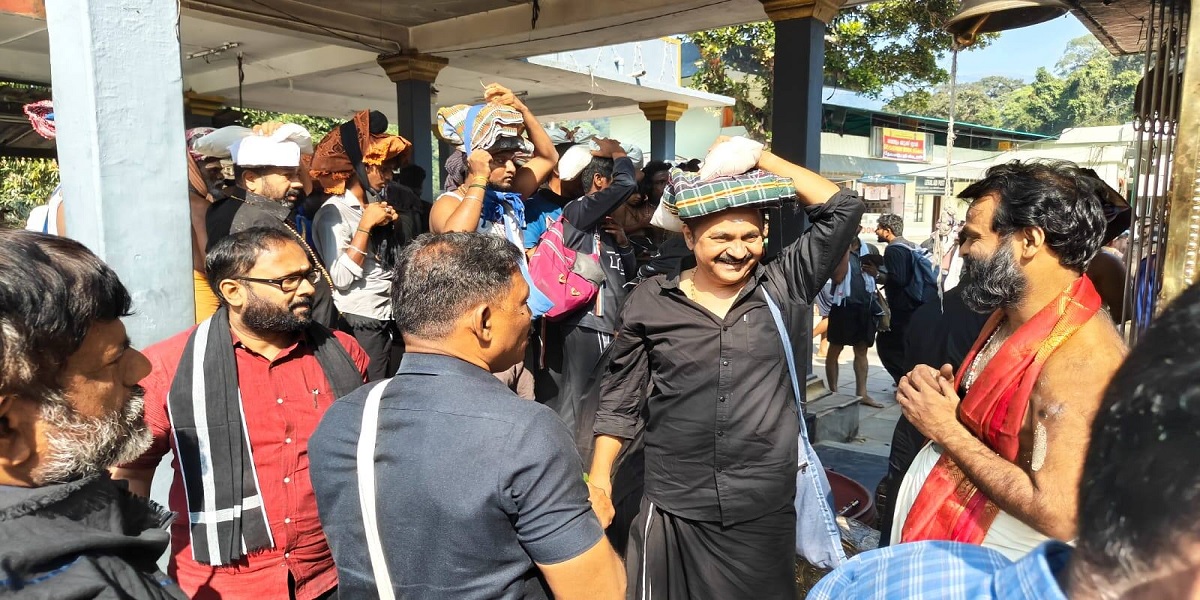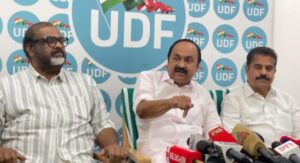Although UDF continues to move forward, many of its allies are unsure of party's revival in Kerala following the Rahul Mamkoottathil row.
Published Sep 03, 2025 | 6:12 PM ⚊ Updated Sep 03, 2025 | 6:52 PM

The UDF's cautious stance highlights a strategic effort to place the LDF under pressure while signaling a measured shift from its earlier positions.
Synopsis: Before addressing the media, UDF held an online meeting on Tuesday with key allies, including IUML and CMP leaders. Sources within the front told South First that most Congress leaders, including senior figures, initially favoured boycotting the event. However, the IUML and CMP advised a more cautious approach. They warned that a direct boycott announcement could trigger backlash, giving BJP and CPM an opportunity to attack the UDF.
Sabarimala, once known as a sacred pilgrimage site for Ayyappa devotees, has in recent years become a focal point of Kerala politics. During every election, political parties view the region as strategically important for vote-bank mobilisation.
The upcoming Global Ayyappa Sangamam, a major event organised by the Travancore Devaswom Board to mark its 75th anniversary in partnership with the Kerala government, is scheduled at Pampa on 20 September. The event has sparked widespread discussion in Kerala due to its political significance, particularly as the state approaches local body and assembly elections.
The Congress-led UDF has now added further heat to the already brewing political concoction. The UDF has stated that it will decide on its participation in the upcoming Global Ayyappa Sangamam at Sabarimala only after the ruling LDF responds to several critical questions, including its alleged role in the “violation of centuries-old tradition” seven years ago.
This was announced on Wednesday by VD Satheesan, leader of the Opposition in the Kerala Assembly.
The UDF’s cautious stance highlights a strategic effort to place the LDF under pressure while signaling a measured shift from its earlier positions.

Opposition leader VD Satheesan, along with UDF convenor Adoor Prakash and Communist Marxist Party Leader CP John
Satheesan, along with UDF convenor Adoor Prakash and Communist Marxist Party leader CP John, addressed the media regarding the Opposition’s stance on the Global Ayyappa Sangamam.
During the press conference, Satheesan clarified, “We are not boycotting the event,” while criticising the LDF for creating “unrest in Sabarimala by endorsing actions that disrupted longstanding customs at the ancient temple.”
He further claimed, “It was the LDF that amended the affidavit submitted by UDF in the Supreme Court, influencing it to back violations of tradition,” alluding to the 2018 Supreme Court ruling that allowed women of menstruating age to enter the hill shrine.
Satheesan also questioned the delay in withdrawing cases against devotees and Congress leaders, including the late Oommen Chandy, who had protested the Left government’s decision to permit “breach of tradition” at the temple.
Highlighting another concern, he noted the pending annual financial obligation that the temple is entitled to under a covenant, namely, receiving ₹84 lakh every year, which has not been fulfilled for the past three years.
“We expect the government to answer these queries first. Only after that will the UDF decide on our participation,” he said.
Satheesan also described the government’s position as “deceitful.”
When asked whether UDF was completely boycotting the event, he replied, “Is this a political convention to declare that? Let the government first answer our questions.”
In 2018, the Supreme Court had overturned the ban barring women of menstruating age from entering the Sabarimala temple, calling it “unconstitutional.” The ruling had triggered widespread protests and is currently under review by a larger bench.
Before addressing the media, UDF held an online meeting on Tuesday with key allies, including IUML and CMP leaders. Sources within the front told South First that most Congress leaders, including senior figures, initially favoured boycotting the event.
However, the IUML and CMP advised a more cautious approach, noting that the issue was both religious and politically sensitive. They warned that a direct boycott announcement could trigger backlash, giving BJP and CPM an opportunity to attack the UDF.
The allies also highlighted the NSS’ participation in the event and reminded that the UDF has traditionally supported all religious programmes, including those of minority communities.
In this context, they felt that taking a rigid stance could harm the front during elections. This is why UDF made a slight shift from its earlier position today.
On 26 August, Opposition Leader VD Satheesan accused the Left government of using the Global Ayyappa Sangamam at Sabarimala as a move to ”appease majority communalism” in Kerala. He remarked that the ruling party might as well organise the event along with the Sangh Parivar, since ”both share the same stance on every issue.”
Satheesan also pointed out that the Opposition had not received an invitation to the programme.
Dr Induchoodan, president of the NSS unit in Central Edappally, Kochi, said that members were surprised by general secretary G Sukumaran Nair’s position on the Global Ayyappa Sangamam.
”Discussions are ongoing with NSS units and the Pandalam palace members to decide a clear stance. We have some conditions. first, the LDF government must clarify its stand on the participation of Bindu Ammini and the issue of women’s entry into Sabarimala. Second, the 35,000 cases registered against poor devotees should be withdrawn. NSS is a force to reckon with in Kerala, so our position has political weight. Poor Hindus are the vote bank of CPM, while elite groups and Christians traditionally support the UDF. In our unit alone, five busloads of people went to protest against women’s entry in Sabarimala. We are also concerned about Tamil Nadu Chief Minister MK Stalin’s involvement, as he has insulted Sanatana Dharma. NSS is already wounded, now the question is whether this event will heal us or create deeper scars.”
When South First approached Baburaj from the SNDP Gurudharma Pracharana Sabha, he said, ”The event is exclusively for Ayyappa devotees, and we are supporting it because we are conscious of protecting Hindu religion and customs. In the future, no one should oppose our culture. For example, everyone knows that the Makarajyoti is lit by the Travancore Devaswom Board, yet devotees still believe it is a miracle. That is faith, and there is no need to question it with science. Our participation ensures that sentiments of devotees are not hurt. It also has political significance, as Ezhavas constitute nearly 24–25 percent of Kerala’s population. This will certainly reflect in elections too.”
Political analyst Zakhariya told South First that politics around Sabarimala is not a new phenomenon in Kerala.
”Lord Ayyappa is one of the highest revenue-earning deities, and unlike Padmanabha temple, his accounts are transparent. That makes him a wealthiest deity. For every government and political party, Lord Ayyappa is crucial. No political front in Kerala can afford to hurt the sentiments of the majority Hindu vote bank, because without their support, no one can come to power. That is why the UDF has now adopted a very strategic stance on the Global Ayyappa Sangamam,” he explained.
Although the UDF continues to move forward with its strategies, insiders told South First that many allies have lost confidence in the front’s chances of returning to power following the Rahul Mamkoottathil controversy. The concern is not solely about the controversy itself but also about the resurgence of groupism within the UDF.
Factionalism in the Congress has become more visible after the episode, though VD Satheesan initially managed to contain it and project unity. Now, however, with the front’s cohesion weakened, allies are increasingly anxious and doubtful about the upcoming elections.
When South First spoke to political analyst and psephologist G Gopakumar, he described the Global Ayyappa Sangamam as “a political gamble.”
According to him, Kerala’s population is composed of around 27 percent Muslims and 19 percent Christians. Among Christians, about 14 percent—including Syrian Catholics, Orthodox, and Jacobites—traditionally support the UDF, while nearly 5 percent of OBC Christians such as Latin Catholics, Salvation Army groups, and Dalit Christians under the SC category generally side with the Left.
He pointed out that Kerala once had only bipolar politics, but the BJP has now emerged as a strong contender.
In the last Lok Sabha elections, the BJP secured nearly 19 percent of the vote share, drawing not only from upper caste Hindus like Nairs and Brahmins, but also from sections of elite Christians and OBC Hindus.
He added that at least 10 percent of OBC Hindus, who earlier backed the Left, shifted to the BJP after the Sabarimala women’s entry controversy.
In this context, Gopakumar noted, “the Global Ayyappa Sangamam appears to be an attempt to win back that lost support for the Left. Its core aim seems to be communal consolidation, though business interests are also evident, as the vision of developing Sabarimala as a pilgrim city is tied to long-term financial gains. Unlike the Maramon Convention or the Cherukolpuzha Hindu gathering, this event will definitely have political consequences. But whether it delivers the intended results is doubtful, especially with the BJP already vying for electoral space.”
“The UDF’s organisational structure in Kerala is currently quite weak. Reviving the Kerala Congress (Mani) faction within the front could strengthen its position and help prevent the migration of elite Christian votes in Travancore towards the Left and the BJP.’’
He concluded with a sharp critique. “In my view, it is inappropriate for a secular government to organise such events. If the Left criticises Modi for bringing the Sengol to Parliament and invoking Hindu symbolism, how is this any different? The Kerala government is treading the same path.”
(Edited by Amit Vasudev)
